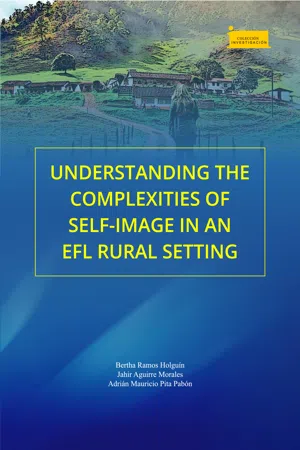
Understanding the Complexities of Self-Image in an EFL Rural Setting
- 64 pages
- English
- ePUB (mobile friendly)
- Available on iOS & Android
Understanding the Complexities of Self-Image in an EFL Rural Setting
About this book
In this book, we looked at self-image from a humanistic perspective. We see it as a dynamic and complex process that compromises self-respect and self-confidence. The protagonists of this story come from a rural area. They were a group of eleventh graders from a high school in Samacá, one of the 123 towns in the state of Boyacá, Colombia. As narrators of the story, we wanted to explore, analyze, and interpret how these adolescents perceived their self-image through their life stories under a narrative inquiry method. By telling their narratives, the students could reconstruct and re-signify their reality, while showing us who they are in relation to other people and their contexts. Therefore, life stories offered us the possibility to explore students' inner and social worlds. This research study helped us increase our sensitivity to how the adolescents saw themselves as part of their rural contexts, as well as how this might affect their futures.ResumenEn este libro comprendimos la auto-imagen desde una perspectiva humana. Es decir, como un proceso dinámico y complejo que se relaciona con el auto-respeto y la auto-confianza. Los protagonistas de esta historia provienen de una zona rural. Ellos son un grupo de estudiantes de grado once de un colegio localizado en Samacá, uno de los 123 municipios que conforman el departamento de Boyacá en Colombia. Como narradores de esta historia, quisimos explorar, analizar e interpretar como estos adolescentes percibían su auto-imagen a través de sus historias de vida, enmarcadas en un método narrativo. Al narrar sus historias, los estudiantes reconstruyeron y resignificaron su realidad mientras nos mostraban su relación con otras personas y su propio contexto. Estas historias de vida nos dieron la posibilidad de explorar su mundo interno y social. Incrementamos nuestra sensibilidad como investigadores y entendimos como los adolescentes se percibían en un contexto rural y las implicaciones que esto tiene para sus vidas futuras.
Frequently asked questions
- Essential is ideal for learners and professionals who enjoy exploring a wide range of subjects. Access the Essential Library with 800,000+ trusted titles and best-sellers across business, personal growth, and the humanities. Includes unlimited reading time and Standard Read Aloud voice.
- Complete: Perfect for advanced learners and researchers needing full, unrestricted access. Unlock 1.4M+ books across hundreds of subjects, including academic and specialized titles. The Complete Plan also includes advanced features like Premium Read Aloud and Research Assistant.
Please note we cannot support devices running on iOS 13 and Android 7 or earlier. Learn more about using the app.
Information

Table of contents
- INTRODUCTION
- THE TRIP THAT WE PLANNED
- OUR FELLOWS IN THIS TRIP
- OUR REST AREAS TO REFLECT UPON THIS FIELD TRIP
- THE EXPERIENCES WE ENCOUNTERED IN OUR JOURNEY
- THE PHOTO ALBUM WE END UP WITH IN THIS VOYAGE
- REFERENCES